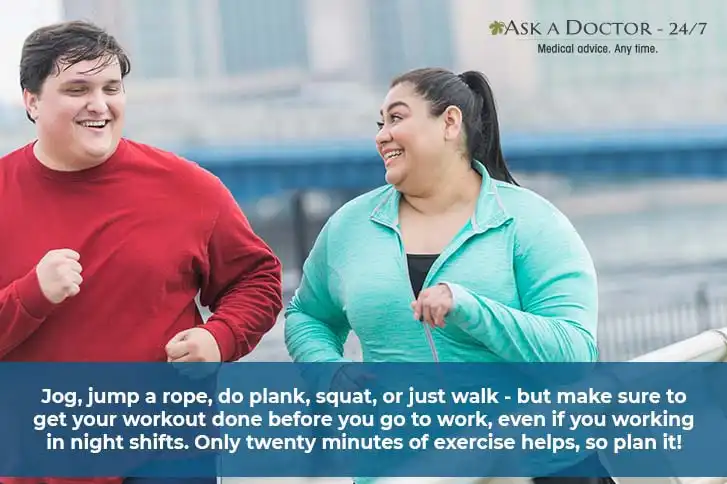Tired Working In Shift Routine? Follow These Tips To Balance Your Work, Life & Health !!
Work, in today’s world, is not like how it used to be in olden days, starting in the morning and getting done by the evening - a toil of eight hours. Times have changed so much that various organizations are operational round the clock, with staff working in shifts supporting customers and clients across the world. In this race to build our careers and lives, often good health is forced to take a backseat.
Since it isn’t an option for many to change their shift (work) timings, let us see how we can make healthy changes to live well while working in shift hours.
#1. Help the biological clock adapt to your shift work hours

The human body has what is called a biological clock, an independent rhythm. It decides, based on external stimuli, when one needs to sleep, wake up, eat and even attend to nature’s calls. The importance of good sleep has been, time and again, reiterated to improve overall health. Working in a different shift timing will cause a jet lag-like effect leading to fatigue, poor mental agility, and insomnia, to name a few.
What should you do?
- Healthy sleep: Make sure that you receive a good 7 to 8 hours of sleep. To identify your sleep schedule, try sleeping soon after finishing work or just before you need to head out to work the next day. Once you know what suits you, consistently maintain that schedule every day.
- Sleep in a dark room: Based on our sensitivity to daylight, the sleep hormone Melatonin is produced to instill sleep. To improve sleep, stay away from electronic gadgets which produce the sleep-disturbing blue light at least two hours before sleep.
- A noise-free bedroom: Although working in shifts demands that we sleep during the day when everyone else is awake, noise is one of the factors which needs to be monitored. Make sure there are no disturbances from external noises while sleeping.
- Sleeping in cooler temperatures: A cool room initiates sleep. Anywhere between 60 and 67 degrees Fahrenheit is an ideal room temperature which helps bring down the body’s core temperature to induce undisturbed sleep.
#2. Maintain a meal time: what and when you eat is important!

Studies have proven that maintaining meal times and sticking to them every day actually helps balance the body’s rhythm (the circadian rhythm). According to the World Health Organization, working in shifts can affect the gastrointestinal functions too. So along with bringing these little tweaks in your mealtime, make sure to consult a Gastroenterologist for better guidance.
What should you do?
- Plan meals in advance: What and when you eat is important. For high energy levels, the body will require more nourishment which can be planned with good food choices. Decide whether or not a meal needs to be prepared in advance and carried to work.
- Take light meals regularly: Take small meals every couple of hours instead of three heavy meals to avoid strain on the digestive system. Light meals will also keep away drowsiness and lack of concentration.
- Take foods that boost energy: Include leafy green vegetables and proteins to attain good energy levels. Take food which is easy to digest like rice, fruits, vegetables, and salads. Avoid sugary foods because they will provide only a short-term boost in energy levels, which will soon dip after they get processed.
- Constant hydration: Drink plenty of water as that will consistently keep mental and physiological performances in check. Drinking water through the night will help fighting fatigue.
#3. Include physical activity despite working weird hours

To maintain overall health while working in shifts, it is important to include physical activity along with good sleep, and healthy diet. Including exercise to the daily routine will not only improve physical health but also mental health, by keeping depression and fatigue at bay.
What should you do?
- Plan your activity sessions: It could be anything from taking your dog for a walk to any physical activity like managing household chores. To make it more fun, social activities with acquaintances and friends in similar shift timings would promote physical fitness and improve your social skills as an added perk.
- Exercise for better sleep: Studies have shown that doing physical exercise raises the quality of sleep. The elevation in body temperature increases the slow wave sleep (SWS). It has been seen that such activity helps with proficient temperature down-regulation which is believed to promote sleep.
- Turn pending household chores into physical exercise: Plan chores and possible errands around your work timings so that the same activity can be turned into physical activity, which improves energy levels even as you get pending work completed.
- Energizing physical activities: If it has been a tiring day where energies are low, then a small walk or simple yoga exercises would do the trick. To get more out of the exercise, a short run, cycling or swimming would be quite refreshing.
Having said all above, the fact remains that there is no exact science or research that actually explains how one can go about maintaining health and lifestyle at optimum levels while working in shifts. Factors may differ from person to person and one needs to gauge and learn about their bodies to take good care of it.
To know more about tips to better one’s lifestyle while working during those odd hours, you can consult our General Physician online.
Ask a Specialist
Recent Questions

